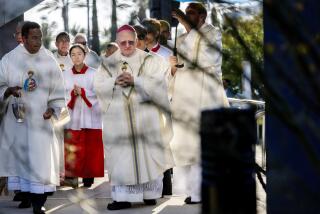Dismissal Is Appealed in Son’s Suicide : Parents Pursue ‘Clergy Malpractice’ Suit
- Share via
An attorney for the parents of a young man who committed suicide while receiving counseling at a Sun Valley church argued Thursday that pastors should not be permitted to hide behind the cloak of religious freedom if they improperly advise emotionally troubled parishioners.
Edward Barker, representing Walter and Maria Nally of Tujunga in their landmark “clergy malpractice” lawsuit against Grace Community Church of the Valley, urged the 2nd District Court of Appeal to reinstate the 1980 suit. The case was dismissed by a Superior Court judge in mid-trial in May, 1985, on the grounds that religious beliefs are protected by the First Amendment.
The Nallys’ eldest son, Kenneth, killed himself with a shotgun in March, 1979, after years of counseling at the fundamentalist church. The Nallys maintain that clergymen at the church knew their 24-year-old son was suicidal but discouraged him from seeking professional help. The suit requests damages but does not specify an amount.
Barker told the three-judge appeals panel Thursday that pastors offering crisis counseling should be held to the same standards as psychologists and psychiatrists, who are licensed and regulated by the state. When improper counseling results in suicide, Barker argued, the church should be held liable, “absolutely regardless of religious belief.”
Barker urged the panel to reverse a Glendale Superior Court judge’s dismissal of the lawsuit and allow the issue to proceed to trial. Judge Joseph R. Kalin threw out the case after four weeks of trial, ruling that any attempt to regulate pastoral counseling would violate the First Amendment’s separation of church and state.
The appeals court is expected to rule within 90 days.
Counseling Part of Doctrine
In urging the justices to uphold the dismissal, church attorney Samuel Ericsson said pastoral counseling practices are “inextricably intertwined” with the church’s religious doctrine and therefore are protected from government interference.
Pastors testified during the 1985 trial that they told the severely depressed Nally that his emotional problems probably resulted from sin, and advised him to read the Bible and lead a godly life.
Ericsson, speaking outside the courtroom, recalled trial testimony from psychologists and psychiatrists called by the Nallys.
“They say that, when somebody is depressed, you don’t talk about sin,” Ericsson said. “We say that, when somebody is depressed, it’s because of sin. That’s religious belief.”
But Barker countered that the church’s religious beliefs are not at issue. He argued that pastors had a duty to investigate Nally’s suicidal ruminations, warn his family and refer him to mental-health professionals. None of those three actions violate church doctrine, Barker said.
“What happened in this case was incompetence,” Barker said. “It had nothing to do with religious belief.”
More to Read
Sign up for Essential California
The most important California stories and recommendations in your inbox every morning.
You may occasionally receive promotional content from the Los Angeles Times.










